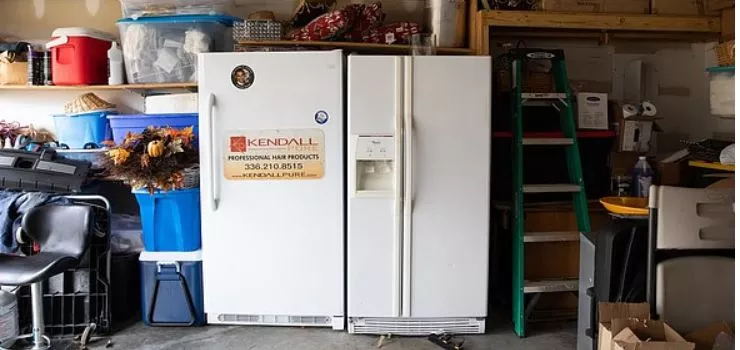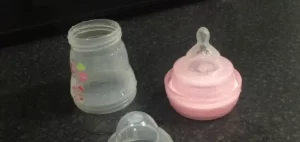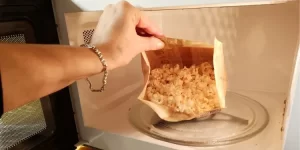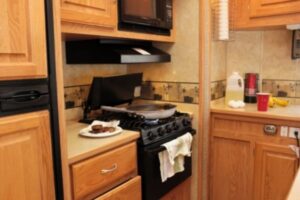It’s cool having a basement—one of those rooms built underground. They can be used for a living space or for storage. They’ve got a reputation for being damp though, so it begs the question, is a fridge in basement safe? Yes, it’s safe, but only if your basement is dry.
Electric appliances and moisture don’t go together. Moisture can affect the fridge’s performance and lifespan. Basements are known to flood too, so unless your basement is dry, keeping a fridge in damp conditions can pose a serious safety risk to you.
Table of Contents
Keeping Fridge in Basement Instead of Kitchen – Pros and Cons
Most kitchens have a host of appliances in them. Perhaps the design of your kitchen can’t accommodate all your essential appliances. If there is an electrical outlet in the basement, the fridge could go there. But is it a wise move?
We look at some pros and cons of placing your fridge in the basement instead of the kitchen.
Pros:
- More room in the kitchen: Moving your fridge down into the basement gives you much-needed space in your kitchen, especially if it’s small.
- Noise reduction: Listen to your fridge, You can actually hear it droning away. Keeping your fridge in the basement can make your kitchen a quieter, more restful place to enjoy a cup of coffee.
Cons:
- Inconvenience: Surely this is the biggest disadvantage of having a fridge in the basement. It can be annoying to have to go down into the basement to fetch milk or something else. When your fridge is in the kitchen, everything is close at hand.
- Moisture damage: Basements are prone to dampness and flooding. You always have to be concerned that your fridge is being exposed to dampness, which can damage it and cause it to malfunction.
- Installation: Moving any appliance isn’t simple. They’re heavy and awkwardly shaped. Even a mini fridge moved down to the basement can be tricky. When moving a fridge down into the basement, one misstep and you and your fridge could end up crashing down the stairs together. Putting a fridge in a caravan, basement, or any other small area you must take into consideration how you will install the fridge.
Is It Safe To Have a Fridge in The Basement?
Yes, it is generally safe to have a fridge in the basement as long as certain precautions are taken. Be sure that your basement isn’t damp and that it is well-ventilated. Not only does dampness cause problems for your fridge, but dampness also encourages the growth of mold.
Mold can cause health problems, some of them serious, such as asthma attacks. Mold can also cause respiratory problems, and allergies, and negatively affect your immune system. With covid an ever-present threat, you can’t afford to risk jeopardizing your health.
With kids in the house, an empty refrigerator in the basement can pose a suffocation danger. The saying ‘out of sight, out of mind’ applies here. When your small children are too quiet for too long, an empty fridge in the basement can be an abhorrent death trap for small kids playing with it. Once the door shuts, there’s no escape. While your refrigerator isn’t in use, make sure it is securely locked.
It’s not always safe to have a fridge in the basement, especially when the concrete basement floor slabs are uneven. If the fridge isn’t on a level surface, it can cause fluctuations in temperature that can spoil your food.
If you do have moisture in your basement, there are steps you can take to rectify the problem –
- Check for moisture – Check to find out what existing moisture issues there are. Check for dampness and make repairs to the problem.
- Ensure proper ventilation – Making sure your basement is well-ventilated will keep air circulating and reduce moisture levels.
- Use a dehumidifier – Choose the right size and capacity dehumidifier. It will then effectively reduce the humidity levels in your basement. This prevents moisture buildup.
- Raise your fridge – Some people prevent moisture from seeping into the fridge by elevating it off the ground and onto a sturdy platform.
How to Install a Fridge in the Basement
Installing a fridge in the basement involves doing a little research. You want to be sure you’ve found the right spot in the basement and that the fridge will be installed safely.
Here are a few steps you can take to ensure your fridge has a safe transition into the basement and that it functions correctly.
- Where will you put your basement fridge? – Go down into your basement and select a suitable spot for your fridge. The area you choose must be level and free from sunshine and moisture – if you are installing a fridge in your garage the same should be done. It must also be uncluttered so that your fridge door can open and close with ease. Has the area got an electrical outlet? If there isn’t one, you will need to install an electrical outlet or invest in an extension cord.
- Check the dimensions – Take a good look at the doorway to the basement and the staircase: Will the fridge be able to pass through the doorways to reach the basement?
- Get help moving your fridge – Moving a fridge, even a mini fridge for your basement isn’t something to attempt on your own. Get someone to help you move the fridge.
- Measure the space – Make sure that the area where you are installing your fridge is wide and high enough to accommodate your fridge’s dimensions.
- Prepare the space – You don’t want to install your fridge on top of dust and debris. Sweep out the area and make sure it is nice and clean for your fridge to stand on.
- Make sure the fridge is level – If your basement fridge isn’t level, try to adjust the feet to make it more level.
Kitchen Fridge vs. Mini Fridge in Basement
Nothing is set in stone as to which fridge is better in the basement – a kitchen fridge or a mini fridge in the basement? The decision to use a particular fridge in the basement will depend on your specific needs. However, there are one or two factors to take into account –
- Costs – We’re living in tough economic times. For many people, mini-fridges are a more affordable option than full-sized fridges. Those on a tight budget can benefit from buying a smaller fridge they can afford.
- Space – Mini fridges are ideal in a basement where there is limited space. You might be using your basement as a storage room, and space for a large fridge is limited. Then again, if you have plenty of space in your basement, a full kitchen fridge would be a better choice. A large fridge offers more storage space for foodstuffs. Some people have a large refrigerator in the kitchen and opt to have a mini fridge in the basement. They buy food in bulk or buy extra food and drinks when on a special. They use the mini fridge for extra storage.
- Energy efficiency – If you’re on a tight budget, a full-sized kitchen fridge will use more energy than a mini fridge. If you’re concerned about energy consumption, a mini fridge will be a better option.
- Noise – If you’re using your basement as a man cave or home office, a full-sized fridge can be far noisier than a mini fridge. Certainly, if noise is a hindrance, choose a mini fridge.
Mold on Basement Fridge
Yes, you can expect to see mold on your fridge if it is in a moist place. If it’s in the basement, and your basement is moist, mold spores will settle on your fridge. Mold spores are in the air, and they will settle on any damp surface.
A fridge positioned in a moist area offers the ideal setting for mold growth, Mold can grow inside your fridge too. Mold is something that requires immediate attention. It has to be removed. Inhaling or ingesting it can cause serious health issues.
If you find mold on or in your fridge, take prompt action to remove it. It can release spores that can be harmful to your health if inhaled or ingested.
What you can do to rid your fridge of mold –
- Don gloves and a face mask before you tackle the mold.
- Remove all your foodstuffs from the fridge.
- Fill a bucket or bowl with equal parts of warm water and white vinegar. You can add some bicarbonate of soda and lemon juice to the water as well. Wipe down the interior and exterior of the fridge.
- Allow the fridge to dry. Leave the fridge door open to allow your fridge to air.
- The mold will return. Find the source of the moisture and attend to it.
If you don’t want to remove mold, call the services of a mold removal company. They will advise you on how to prevent the growth of mold in the future. The beauty of their services is that they offer long-term solutions to your mold problems.
Before you bring any fridge home, think of the purpose of the appliance. Will a mini fridge be better than a large fridge? Basements may not be the better choice for a fridge than a kitchen, but having a second fridge in the basement can be a super convenient choice.








